Sociology and Social Science Assignment: Ethical Theories Explored
VerifiedAdded on 2023/06/04
|7
|1999
|295
Essay
AI Summary
This sociology assignment explores various ethical theories, including consequentialism, non-consequentialism, and virtue ethics, defining each and providing examples. It examines the strengths and weaknesses of these theories, such as Care Ethics and Kant's Duty Ethics, and Confucian Role Ethics. The assignment also delves into the concepts of absolutism and relativism, exploring how they can be reconciled. Furthermore, it investigates determinism, specifically biological determinism, and its implications for free moral choice, using examples like the impact of biological states on decision-making. The assignment includes comprehensive references to support the analysis and arguments presented.
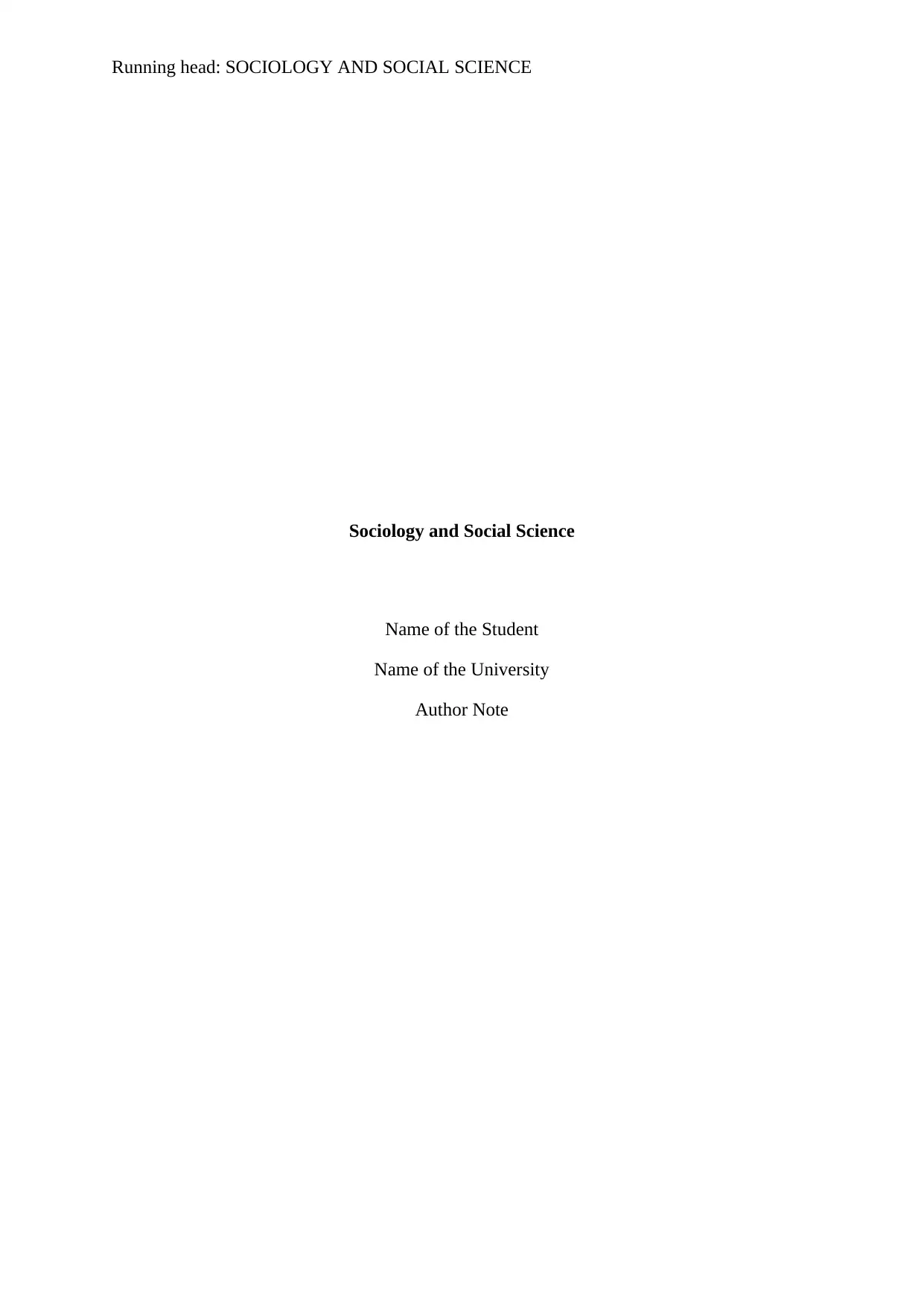
Running head: SOCIOLOGY AND SOCIAL SCIENCE
Sociology and Social Science
Name of the Student
Name of the University
Author Note
Sociology and Social Science
Name of the Student
Name of the University
Author Note
Paraphrase This Document
Need a fresh take? Get an instant paraphrase of this document with our AI Paraphraser
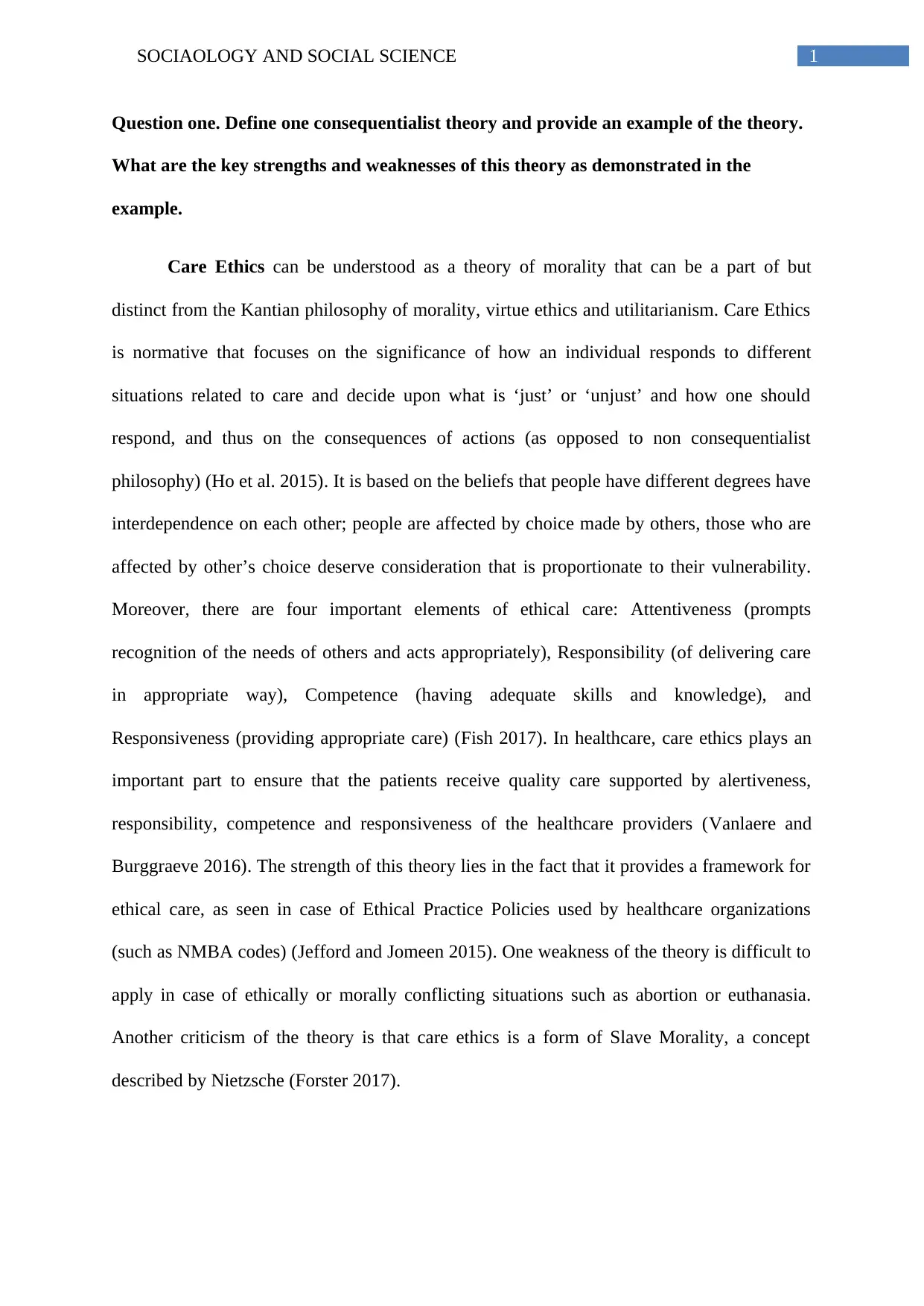
1SOCIAOLOGY AND SOCIAL SCIENCE
Question one. Define one consequentialist theory and provide an example of the theory.
What are the key strengths and weaknesses of this theory as demonstrated in the
example.
Care Ethics can be understood as a theory of morality that can be a part of but
distinct from the Kantian philosophy of morality, virtue ethics and utilitarianism. Care Ethics
is normative that focuses on the significance of how an individual responds to different
situations related to care and decide upon what is ‘just’ or ‘unjust’ and how one should
respond, and thus on the consequences of actions (as opposed to non consequentialist
philosophy) (Ho et al. 2015). It is based on the beliefs that people have different degrees have
interdependence on each other; people are affected by choice made by others, those who are
affected by other’s choice deserve consideration that is proportionate to their vulnerability.
Moreover, there are four important elements of ethical care: Attentiveness (prompts
recognition of the needs of others and acts appropriately), Responsibility (of delivering care
in appropriate way), Competence (having adequate skills and knowledge), and
Responsiveness (providing appropriate care) (Fish 2017). In healthcare, care ethics plays an
important part to ensure that the patients receive quality care supported by alertiveness,
responsibility, competence and responsiveness of the healthcare providers (Vanlaere and
Burggraeve 2016). The strength of this theory lies in the fact that it provides a framework for
ethical care, as seen in case of Ethical Practice Policies used by healthcare organizations
(such as NMBA codes) (Jefford and Jomeen 2015). One weakness of the theory is difficult to
apply in case of ethically or morally conflicting situations such as abortion or euthanasia.
Another criticism of the theory is that care ethics is a form of Slave Morality, a concept
described by Nietzsche (Forster 2017).
Question one. Define one consequentialist theory and provide an example of the theory.
What are the key strengths and weaknesses of this theory as demonstrated in the
example.
Care Ethics can be understood as a theory of morality that can be a part of but
distinct from the Kantian philosophy of morality, virtue ethics and utilitarianism. Care Ethics
is normative that focuses on the significance of how an individual responds to different
situations related to care and decide upon what is ‘just’ or ‘unjust’ and how one should
respond, and thus on the consequences of actions (as opposed to non consequentialist
philosophy) (Ho et al. 2015). It is based on the beliefs that people have different degrees have
interdependence on each other; people are affected by choice made by others, those who are
affected by other’s choice deserve consideration that is proportionate to their vulnerability.
Moreover, there are four important elements of ethical care: Attentiveness (prompts
recognition of the needs of others and acts appropriately), Responsibility (of delivering care
in appropriate way), Competence (having adequate skills and knowledge), and
Responsiveness (providing appropriate care) (Fish 2017). In healthcare, care ethics plays an
important part to ensure that the patients receive quality care supported by alertiveness,
responsibility, competence and responsiveness of the healthcare providers (Vanlaere and
Burggraeve 2016). The strength of this theory lies in the fact that it provides a framework for
ethical care, as seen in case of Ethical Practice Policies used by healthcare organizations
(such as NMBA codes) (Jefford and Jomeen 2015). One weakness of the theory is difficult to
apply in case of ethically or morally conflicting situations such as abortion or euthanasia.
Another criticism of the theory is that care ethics is a form of Slave Morality, a concept
described by Nietzsche (Forster 2017).

2SOCIAOLOGY AND SOCIAL SCIENCE
Question two. Define one Non-Consequentialist Theory and provide an example to this
theory. What are the key strengths and weaknesses of this theory as demonstrated in
example.
According to the Duty Ethics of Kant, the morality of an action depends on whether
an individual is able to fulfill his/her duty and not on the consequence of the action (as seen
in case of the consequentialist philosophy). It is a deontological moral theory that is based on
the categorical imperative that determines our moral duties and a perfect duty is one that does
not involve lies and is always true (Wood 2017). Utilization of this philosophy can also be
seen in healthcare, which binds the doctors to fulfill their duties to care for the patients as an
end in itself and not merely as the means to an end (improvement in health and wellbeing).
This philosophy thus increases the sense of duty of the physicians towards the care of the
patient and improves peer interaction, which is significantly advantageous in healthcare
organizations (Crisp 2017). The weakness of the philosophy is that it takes away focus from
the consequences of actions and puts too much emphasis on the duty on the intent of the
action. Thus any action done out of a good intent but having adverse consequences can still
be considered moral and thus can provide clinical errors a clean pass (Cohen-Almagor 2017).
Question 3. Define one virtue ethics theory and provide an example of this theory.
What are the key strengths and weaknesses of this theory demonstrated in the example?
Confucian Role Ethics is a philosophy that is similar to the virtue of ethics and is
based on the collective morality instead of an individualist morality. Thus this philosophy
focuses on the significance of family values and the roles of the family members as well as
the significant of community in the development of collective virtues. It is further implied
that the moral values of an individual serves as a form of social capital, thus highlighting its
importance in the society (Stephens 2018). An example where such philosophy can be
Question two. Define one Non-Consequentialist Theory and provide an example to this
theory. What are the key strengths and weaknesses of this theory as demonstrated in
example.
According to the Duty Ethics of Kant, the morality of an action depends on whether
an individual is able to fulfill his/her duty and not on the consequence of the action (as seen
in case of the consequentialist philosophy). It is a deontological moral theory that is based on
the categorical imperative that determines our moral duties and a perfect duty is one that does
not involve lies and is always true (Wood 2017). Utilization of this philosophy can also be
seen in healthcare, which binds the doctors to fulfill their duties to care for the patients as an
end in itself and not merely as the means to an end (improvement in health and wellbeing).
This philosophy thus increases the sense of duty of the physicians towards the care of the
patient and improves peer interaction, which is significantly advantageous in healthcare
organizations (Crisp 2017). The weakness of the philosophy is that it takes away focus from
the consequences of actions and puts too much emphasis on the duty on the intent of the
action. Thus any action done out of a good intent but having adverse consequences can still
be considered moral and thus can provide clinical errors a clean pass (Cohen-Almagor 2017).
Question 3. Define one virtue ethics theory and provide an example of this theory.
What are the key strengths and weaknesses of this theory demonstrated in the example?
Confucian Role Ethics is a philosophy that is similar to the virtue of ethics and is
based on the collective morality instead of an individualist morality. Thus this philosophy
focuses on the significance of family values and the roles of the family members as well as
the significant of community in the development of collective virtues. It is further implied
that the moral values of an individual serves as a form of social capital, thus highlighting its
importance in the society (Stephens 2018). An example where such philosophy can be
⊘ This is a preview!⊘
Do you want full access?
Subscribe today to unlock all pages.

Trusted by 1+ million students worldwide
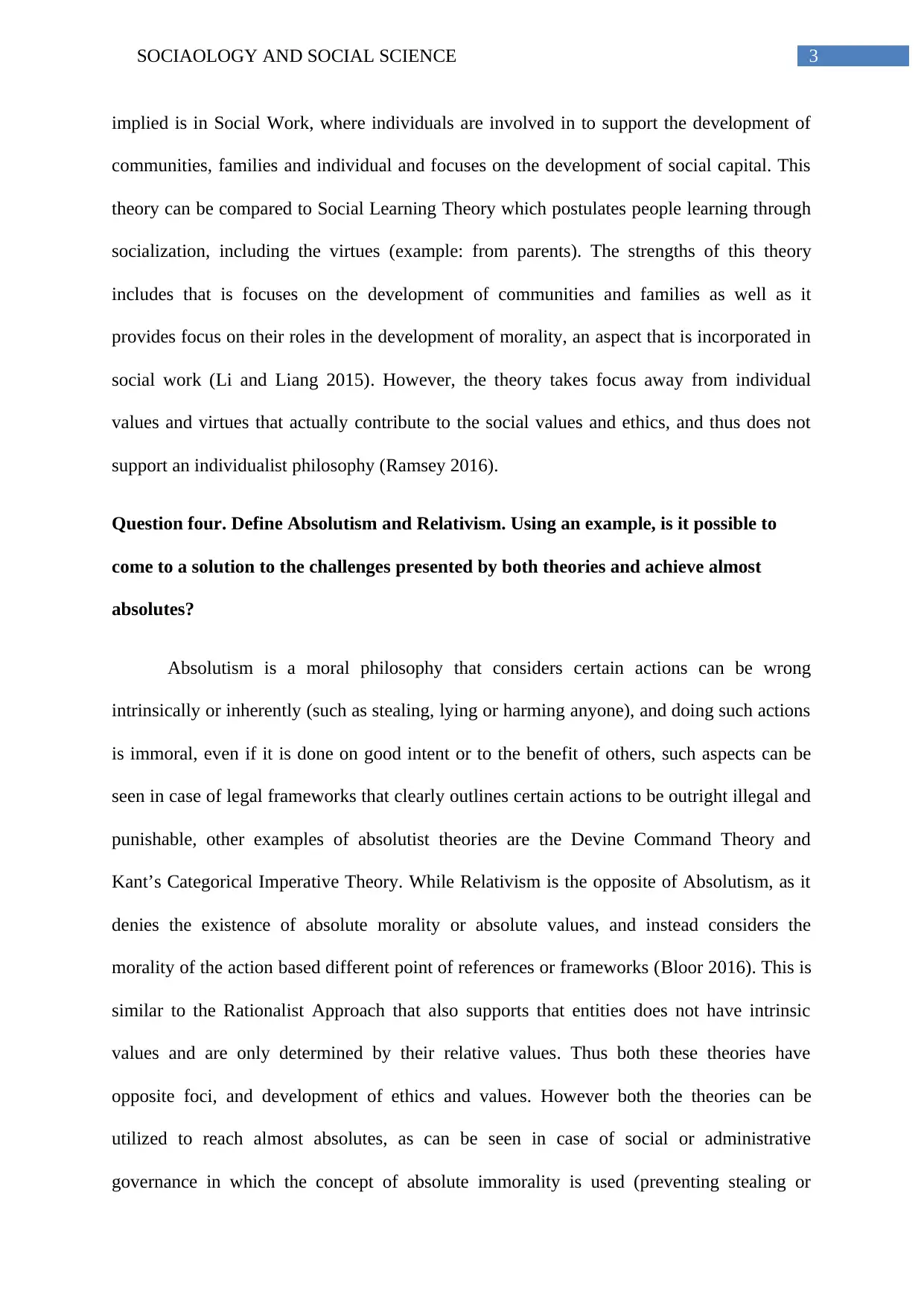
3SOCIAOLOGY AND SOCIAL SCIENCE
implied is in Social Work, where individuals are involved in to support the development of
communities, families and individual and focuses on the development of social capital. This
theory can be compared to Social Learning Theory which postulates people learning through
socialization, including the virtues (example: from parents). The strengths of this theory
includes that is focuses on the development of communities and families as well as it
provides focus on their roles in the development of morality, an aspect that is incorporated in
social work (Li and Liang 2015). However, the theory takes focus away from individual
values and virtues that actually contribute to the social values and ethics, and thus does not
support an individualist philosophy (Ramsey 2016).
Question four. Define Absolutism and Relativism. Using an example, is it possible to
come to a solution to the challenges presented by both theories and achieve almost
absolutes?
Absolutism is a moral philosophy that considers certain actions can be wrong
intrinsically or inherently (such as stealing, lying or harming anyone), and doing such actions
is immoral, even if it is done on good intent or to the benefit of others, such aspects can be
seen in case of legal frameworks that clearly outlines certain actions to be outright illegal and
punishable, other examples of absolutist theories are the Devine Command Theory and
Kant’s Categorical Imperative Theory. While Relativism is the opposite of Absolutism, as it
denies the existence of absolute morality or absolute values, and instead considers the
morality of the action based different point of references or frameworks (Bloor 2016). This is
similar to the Rationalist Approach that also supports that entities does not have intrinsic
values and are only determined by their relative values. Thus both these theories have
opposite foci, and development of ethics and values. However both the theories can be
utilized to reach almost absolutes, as can be seen in case of social or administrative
governance in which the concept of absolute immorality is used (preventing stealing or
implied is in Social Work, where individuals are involved in to support the development of
communities, families and individual and focuses on the development of social capital. This
theory can be compared to Social Learning Theory which postulates people learning through
socialization, including the virtues (example: from parents). The strengths of this theory
includes that is focuses on the development of communities and families as well as it
provides focus on their roles in the development of morality, an aspect that is incorporated in
social work (Li and Liang 2015). However, the theory takes focus away from individual
values and virtues that actually contribute to the social values and ethics, and thus does not
support an individualist philosophy (Ramsey 2016).
Question four. Define Absolutism and Relativism. Using an example, is it possible to
come to a solution to the challenges presented by both theories and achieve almost
absolutes?
Absolutism is a moral philosophy that considers certain actions can be wrong
intrinsically or inherently (such as stealing, lying or harming anyone), and doing such actions
is immoral, even if it is done on good intent or to the benefit of others, such aspects can be
seen in case of legal frameworks that clearly outlines certain actions to be outright illegal and
punishable, other examples of absolutist theories are the Devine Command Theory and
Kant’s Categorical Imperative Theory. While Relativism is the opposite of Absolutism, as it
denies the existence of absolute morality or absolute values, and instead considers the
morality of the action based different point of references or frameworks (Bloor 2016). This is
similar to the Rationalist Approach that also supports that entities does not have intrinsic
values and are only determined by their relative values. Thus both these theories have
opposite foci, and development of ethics and values. However both the theories can be
utilized to reach almost absolutes, as can be seen in case of social or administrative
governance in which the concept of absolute immorality is used (preventing stealing or
Paraphrase This Document
Need a fresh take? Get an instant paraphrase of this document with our AI Paraphraser
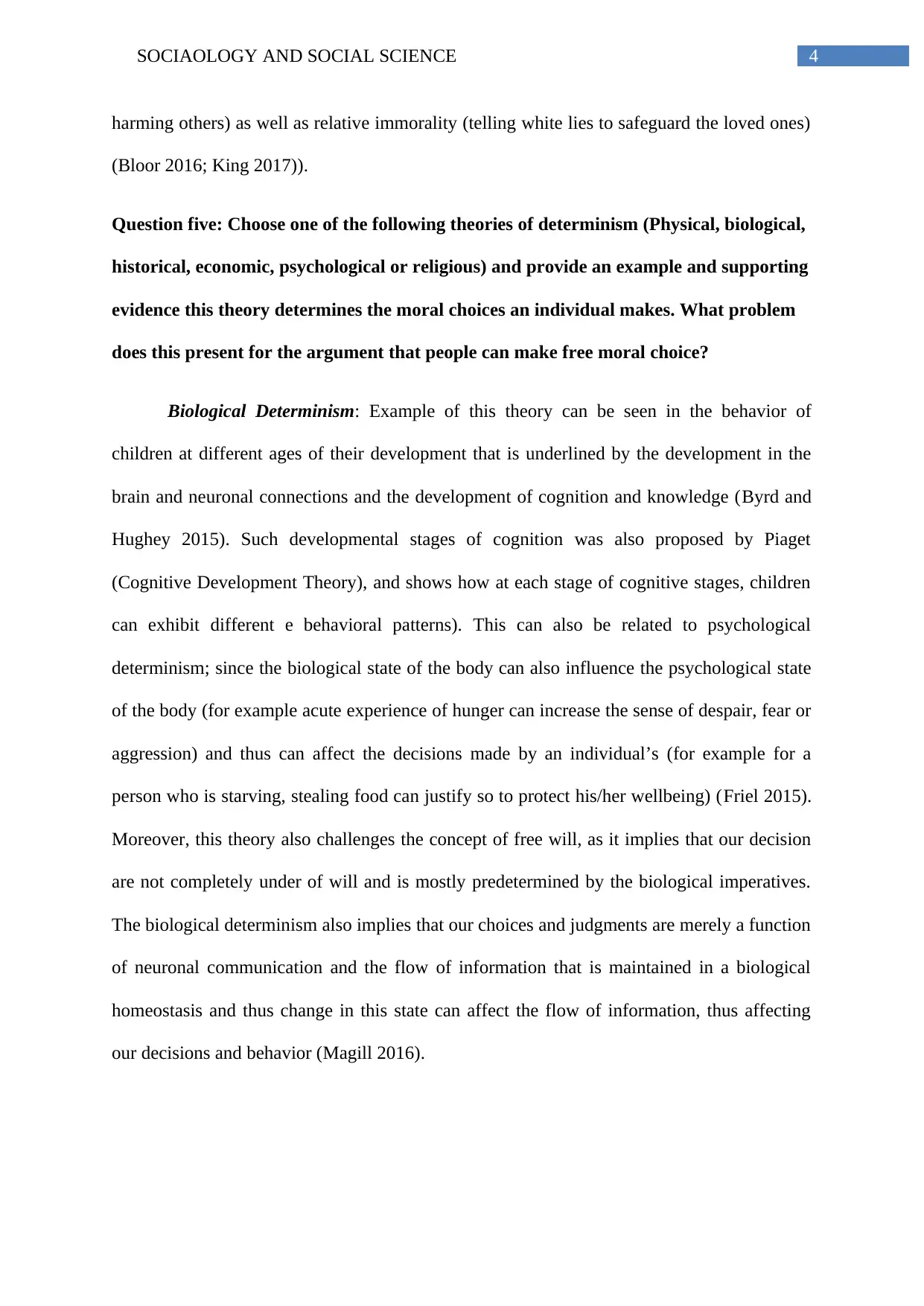
4SOCIAOLOGY AND SOCIAL SCIENCE
harming others) as well as relative immorality (telling white lies to safeguard the loved ones)
(Bloor 2016; King 2017)).
Question five: Choose one of the following theories of determinism (Physical, biological,
historical, economic, psychological or religious) and provide an example and supporting
evidence this theory determines the moral choices an individual makes. What problem
does this present for the argument that people can make free moral choice?
Biological Determinism: Example of this theory can be seen in the behavior of
children at different ages of their development that is underlined by the development in the
brain and neuronal connections and the development of cognition and knowledge (Byrd and
Hughey 2015). Such developmental stages of cognition was also proposed by Piaget
(Cognitive Development Theory), and shows how at each stage of cognitive stages, children
can exhibit different e behavioral patterns). This can also be related to psychological
determinism; since the biological state of the body can also influence the psychological state
of the body (for example acute experience of hunger can increase the sense of despair, fear or
aggression) and thus can affect the decisions made by an individual’s (for example for a
person who is starving, stealing food can justify so to protect his/her wellbeing) (Friel 2015).
Moreover, this theory also challenges the concept of free will, as it implies that our decision
are not completely under of will and is mostly predetermined by the biological imperatives.
The biological determinism also implies that our choices and judgments are merely a function
of neuronal communication and the flow of information that is maintained in a biological
homeostasis and thus change in this state can affect the flow of information, thus affecting
our decisions and behavior (Magill 2016).
harming others) as well as relative immorality (telling white lies to safeguard the loved ones)
(Bloor 2016; King 2017)).
Question five: Choose one of the following theories of determinism (Physical, biological,
historical, economic, psychological or religious) and provide an example and supporting
evidence this theory determines the moral choices an individual makes. What problem
does this present for the argument that people can make free moral choice?
Biological Determinism: Example of this theory can be seen in the behavior of
children at different ages of their development that is underlined by the development in the
brain and neuronal connections and the development of cognition and knowledge (Byrd and
Hughey 2015). Such developmental stages of cognition was also proposed by Piaget
(Cognitive Development Theory), and shows how at each stage of cognitive stages, children
can exhibit different e behavioral patterns). This can also be related to psychological
determinism; since the biological state of the body can also influence the psychological state
of the body (for example acute experience of hunger can increase the sense of despair, fear or
aggression) and thus can affect the decisions made by an individual’s (for example for a
person who is starving, stealing food can justify so to protect his/her wellbeing) (Friel 2015).
Moreover, this theory also challenges the concept of free will, as it implies that our decision
are not completely under of will and is mostly predetermined by the biological imperatives.
The biological determinism also implies that our choices and judgments are merely a function
of neuronal communication and the flow of information that is maintained in a biological
homeostasis and thus change in this state can affect the flow of information, thus affecting
our decisions and behavior (Magill 2016).
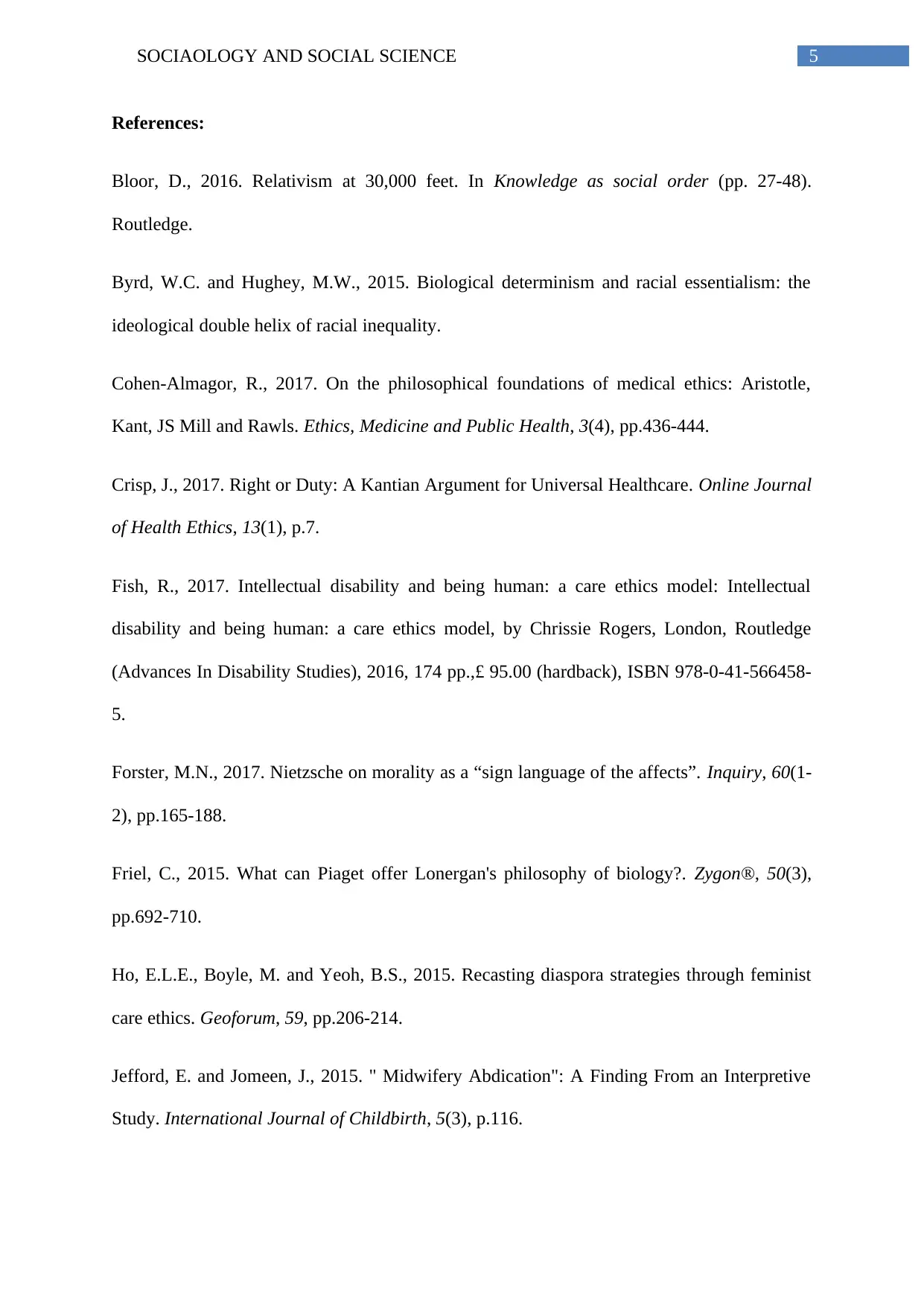
5SOCIAOLOGY AND SOCIAL SCIENCE
References:
Bloor, D., 2016. Relativism at 30,000 feet. In Knowledge as social order (pp. 27-48).
Routledge.
Byrd, W.C. and Hughey, M.W., 2015. Biological determinism and racial essentialism: the
ideological double helix of racial inequality.
Cohen-Almagor, R., 2017. On the philosophical foundations of medical ethics: Aristotle,
Kant, JS Mill and Rawls. Ethics, Medicine and Public Health, 3(4), pp.436-444.
Crisp, J., 2017. Right or Duty: A Kantian Argument for Universal Healthcare. Online Journal
of Health Ethics, 13(1), p.7.
Fish, R., 2017. Intellectual disability and being human: a care ethics model: Intellectual
disability and being human: a care ethics model, by Chrissie Rogers, London, Routledge
(Advances In Disability Studies), 2016, 174 pp.,£ 95.00 (hardback), ISBN 978-0-41-566458-
5.
Forster, M.N., 2017. Nietzsche on morality as a “sign language of the affects”. Inquiry, 60(1-
2), pp.165-188.
Friel, C., 2015. What can Piaget offer Lonergan's philosophy of biology?. Zygon®, 50(3),
pp.692-710.
Ho, E.L.E., Boyle, M. and Yeoh, B.S., 2015. Recasting diaspora strategies through feminist
care ethics. Geoforum, 59, pp.206-214.
Jefford, E. and Jomeen, J., 2015. " Midwifery Abdication": A Finding From an Interpretive
Study. International Journal of Childbirth, 5(3), p.116.
References:
Bloor, D., 2016. Relativism at 30,000 feet. In Knowledge as social order (pp. 27-48).
Routledge.
Byrd, W.C. and Hughey, M.W., 2015. Biological determinism and racial essentialism: the
ideological double helix of racial inequality.
Cohen-Almagor, R., 2017. On the philosophical foundations of medical ethics: Aristotle,
Kant, JS Mill and Rawls. Ethics, Medicine and Public Health, 3(4), pp.436-444.
Crisp, J., 2017. Right or Duty: A Kantian Argument for Universal Healthcare. Online Journal
of Health Ethics, 13(1), p.7.
Fish, R., 2017. Intellectual disability and being human: a care ethics model: Intellectual
disability and being human: a care ethics model, by Chrissie Rogers, London, Routledge
(Advances In Disability Studies), 2016, 174 pp.,£ 95.00 (hardback), ISBN 978-0-41-566458-
5.
Forster, M.N., 2017. Nietzsche on morality as a “sign language of the affects”. Inquiry, 60(1-
2), pp.165-188.
Friel, C., 2015. What can Piaget offer Lonergan's philosophy of biology?. Zygon®, 50(3),
pp.692-710.
Ho, E.L.E., Boyle, M. and Yeoh, B.S., 2015. Recasting diaspora strategies through feminist
care ethics. Geoforum, 59, pp.206-214.
Jefford, E. and Jomeen, J., 2015. " Midwifery Abdication": A Finding From an Interpretive
Study. International Journal of Childbirth, 5(3), p.116.
⊘ This is a preview!⊘
Do you want full access?
Subscribe today to unlock all pages.

Trusted by 1+ million students worldwide
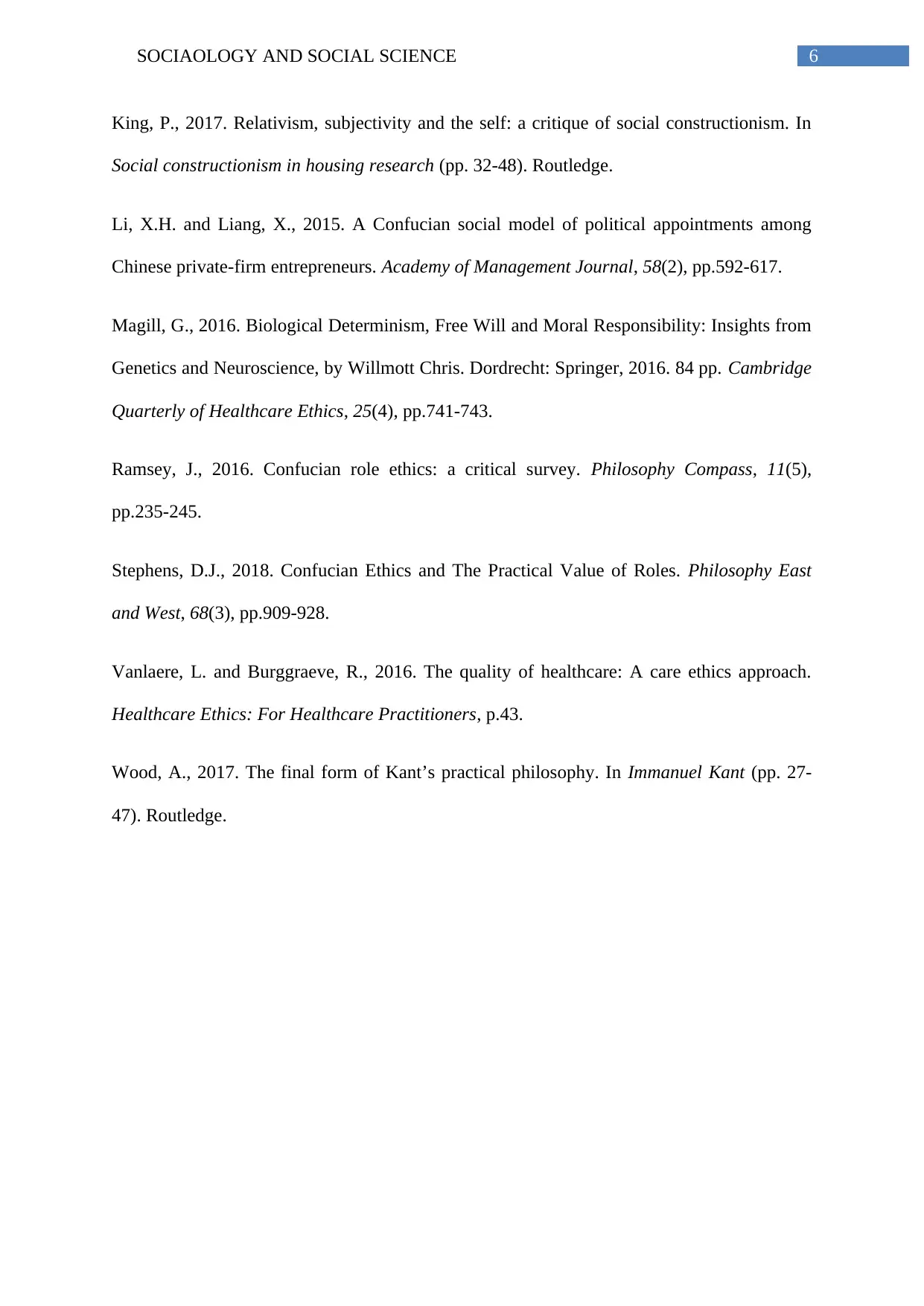
6SOCIAOLOGY AND SOCIAL SCIENCE
King, P., 2017. Relativism, subjectivity and the self: a critique of social constructionism. In
Social constructionism in housing research (pp. 32-48). Routledge.
Li, X.H. and Liang, X., 2015. A Confucian social model of political appointments among
Chinese private-firm entrepreneurs. Academy of Management Journal, 58(2), pp.592-617.
Magill, G., 2016. Biological Determinism, Free Will and Moral Responsibility: Insights from
Genetics and Neuroscience, by Willmott Chris. Dordrecht: Springer, 2016. 84 pp. Cambridge
Quarterly of Healthcare Ethics, 25(4), pp.741-743.
Ramsey, J., 2016. Confucian role ethics: a critical survey. Philosophy Compass, 11(5),
pp.235-245.
Stephens, D.J., 2018. Confucian Ethics and The Practical Value of Roles. Philosophy East
and West, 68(3), pp.909-928.
Vanlaere, L. and Burggraeve, R., 2016. The quality of healthcare: A care ethics approach.
Healthcare Ethics: For Healthcare Practitioners, p.43.
Wood, A., 2017. The final form of Kant’s practical philosophy. In Immanuel Kant (pp. 27-
47). Routledge.
King, P., 2017. Relativism, subjectivity and the self: a critique of social constructionism. In
Social constructionism in housing research (pp. 32-48). Routledge.
Li, X.H. and Liang, X., 2015. A Confucian social model of political appointments among
Chinese private-firm entrepreneurs. Academy of Management Journal, 58(2), pp.592-617.
Magill, G., 2016. Biological Determinism, Free Will and Moral Responsibility: Insights from
Genetics and Neuroscience, by Willmott Chris. Dordrecht: Springer, 2016. 84 pp. Cambridge
Quarterly of Healthcare Ethics, 25(4), pp.741-743.
Ramsey, J., 2016. Confucian role ethics: a critical survey. Philosophy Compass, 11(5),
pp.235-245.
Stephens, D.J., 2018. Confucian Ethics and The Practical Value of Roles. Philosophy East
and West, 68(3), pp.909-928.
Vanlaere, L. and Burggraeve, R., 2016. The quality of healthcare: A care ethics approach.
Healthcare Ethics: For Healthcare Practitioners, p.43.
Wood, A., 2017. The final form of Kant’s practical philosophy. In Immanuel Kant (pp. 27-
47). Routledge.
1 out of 7
Related Documents
Your All-in-One AI-Powered Toolkit for Academic Success.
+13062052269
info@desklib.com
Available 24*7 on WhatsApp / Email
![[object Object]](/_next/static/media/star-bottom.7253800d.svg)
Unlock your academic potential
Copyright © 2020–2026 A2Z Services. All Rights Reserved. Developed and managed by ZUCOL.




